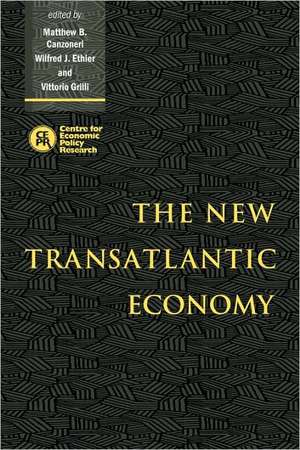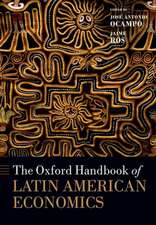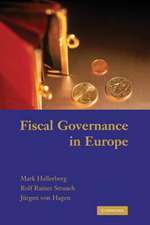The New Transatlantic Economy
Editat de Matthew Canzoneri, Wilfred Ethier, Vittorio Grillien Limba Engleză Paperback – 9 iun 2010
| Toate formatele și edițiile | Preț | Express |
|---|---|---|
| Paperback (1) | 321.90 lei 6-8 săpt. | |
| Cambridge University Press – 9 iun 2010 | 321.90 lei 6-8 săpt. | |
| Hardback (1) | 784.32 lei 6-8 săpt. | |
| Cambridge University Press – 6 noi 1996 | 784.32 lei 6-8 săpt. |
Preț: 321.90 lei
Nou
Puncte Express: 483
Preț estimativ în valută:
61.60€ • 64.08$ • 50.86£
61.60€ • 64.08$ • 50.86£
Carte tipărită la comandă
Livrare economică 14-28 aprilie
Preluare comenzi: 021 569.72.76
Specificații
ISBN-13: 9780521142625
ISBN-10: 0521142628
Pagini: 352
Dimensiuni: 152 x 229 x 20 mm
Greutate: 0.52 kg
Editura: Cambridge University Press
Colecția Cambridge University Press
Locul publicării:Cambridge, United Kingdom
ISBN-10: 0521142628
Pagini: 352
Dimensiuni: 152 x 229 x 20 mm
Greutate: 0.52 kg
Editura: Cambridge University Press
Colecția Cambridge University Press
Locul publicării:Cambridge, United Kingdom
Cuprins
List of figures; List of tables; Preface; List of conference participants; 1. Introduction Matthew B. Canzoneri, Wilfred J. Ethier, and Vittorio Grilli; 2. Transatlantic policy coordination with sticky labour markets: the reality of the real side Andrew Hughes Hallett and Yue Ma; Discussion Nouriel Roubini; 3. Foreign exchange intervention and international policy coordination: comparing the G3 and EMS experience Axel A. Weber; Discussion Joseph Gagnon; 4. Trading blocs and the sustainability of interregional cooperation Eric Bond and Constantinos Syropoulos; Discussion Konstantine Gatsios; 5. The effects of trade liberalization on the members of a trading bloc: a lumpy country analysis Alan V. Deardorff; Discussion L. Alan Winters; 6. The increased importance of direct investment in North Atlantic economic relationships: a convergence hypothesis James R. Markusen and Anthony J. Venables; Discussion Alasdair Smith; 7. Speculative attacks on pegged exchange rates: an empirical exploration with special reference to the European Monetary System Barry Eichengreen, Andrew K. Rose, and Charles Wyplosz; Discussion Robert E. Cumby, Robert P. Flood; 8. Central banks and reputation: some transatlantic contrasts Ben Lockwood, Marcus Miller, and Lei Zhang; Discussion Stanley W. Black; 9. Trade liberalization and trade adjustment assistance K. C. Fung and Robert W. Staiger; Discussion Constantinos Syropoulos; 10. Trade liberalization as politically optimal exchange of market access Arye L. Hillman and Peter Moser; Discussion Martin Richardson; Index.
Recenzii
"All the papers presented in this volume are of a high standard, and are of relevance to policy makers and scholars." Ian Barnes, European Integration
Descriere
An economic analysis of the causes and effects of the breaking up of the transatlantic economy, first published in 1996.











